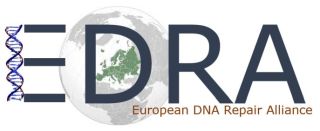|
|
|
Previous webinars > 17th EDRA Webinar - September 23rd, 202517th EDRA Webinar - September 23rd, 2025, from 4:00 to 5:30 pm (CET)
Jessica Downs - Keynote speaker The Instute of Cancer Research - London, United Kingdom (UK) The catalytic subunit of SWI/SNF helps maintain genome stability at G-quadruplexes G-quadruplex (G4) structures are secondary structures that can form in guanine-rich single stranded DNA sequences. These play important roles in biological processes such as regulation of gene expression but can also pose challenges to activities such as DNA replication and lead to genome instability. The catalytic SMARCA4 (BRG1) subunit of the SWI/SNF chromatin remodelling complexes has been identified as a G4 binding protein, and evidence suggests that this interaction can promote SWI/SNF-dependent gene expression. SMARCA4 is frequently misregulated in cancer where genome instability is common, raising the possibility that SWI/SNF remodelling could play a role in maintaining genome stability at G4 sequences. Here, we mapped unrepaired DNA breaks and found these are more likely to co-localise with G4 forming structures in SMARCA4-deficient cells when compared with isogenic control cells. Interestingly, using whole genome sequencing approaches in these cell line models, we find that misrepair events in SMARCA4 deficient cells are more likely to map to G4 forming sequences, suggesting that the repair of G4 associated DSBs is not accurate when SMARCA4 is deficient. Consistent with this, we find that SMARCA4-deficient cancer samples have a higher level of G4-associated genome alterations compared with SMARCA4-proficient cancer samples, and this association is greater than expected by chance. Finally, we show that SMARCA4-deficient cells are selectively sensitive to G4-binding ligands. These findings uncover an important role for SMARCA4 in promoting genome stability at G4 sequences.
Yasmina Djeghmoum - Short talk
Laboratoire de biologie et modélisation de la cellule - Ecole Normale Supérieure de Lyon - Lyon, France Donor transcription suppresses D-loops in cis and promotes genome stability Homologous recombination (HR) is a template-dependent mechanism for the repair of DNA double-strand breaks. Unlike replication and transcription, the possible conflicts between transcription and HR have not been thoroughly investigated. Here, we addressed whether transcription carried out by the RNA polymerase II interferes with D-loop metabolism and how this interference promotes HR fidelity. Our work shows that transcription of the “donor” molecule causes D-loop disruption and inhibits downstream repair steps. This inhibition occurs acutely and is independent of endogenous transcription factors, RNA/DNA hybrids, or the RNA produced in trans. Instead, the acute disruption of D-loops upon transcription activation is dependent on transcription orientation, suggesting a direct effect of the RNA Pol II motor in disrupting D-loops in cis. Depending on promoter strength, transcription can be the major D-loop disruption pathway, acting independently of previously characterized trans-D-loop disruption activities mediated by Sgs1-Top3-Rmi1BLM-TOPO3-RMI1/2, Mph1FANCM, and Srs2. This cis-acting layer of HR regulation inhibits the formation of chromosomal rearrangements induced upon endonucleolytic processing of multi-invasion DNA joint molecules. Consequently, transcription mediated by RNA Polymerase II is a novel cis-acting negative regulator of HR at the D-loop level that unevenly protects the genome against repeat-mediated chromosomal rearrangements.
Sree Rama Chaitanya Sridhara - Short talk
Centro de Biologia Molecular Severo Ochoa (CBM) - Madrid, Spain Unravelling the function of pathogenic BRCA2 variants in transcription and chromatin remodelling Earlier reports suggest that a biallelic loss in monoallelic BRCA2 germline carriers precedes tumorigenesis; however, recent evidence suggests that a monoallelic mutation may be sufficient for this. The mechanisms by which cells with a monoallelic BRCA2 mutation transform into cancer cells remain elusive, a crucial prerequisite for therapeutic interventions. To investigate this, we recreated two heterozygous BRCA2 pathogenic truncating mutations 999del5 (or +/del5) and 5946delT (or +/delT) in nontumorigenic breast epithelial cells. +/del5 cells exhibited haploinsufficiency, reduced homologous recombination repair, and sensitivity to PARP inhibitor (PARPi). Interestingly, +/delT cells expressed similar levels of full-length BRCA2, comparable to those of parental cells, and exhibited hyper-resistance to PARPi, in addition to other DNA-damaging agents (e.g., mitomycin C). Notably, +/delT cells exhibited transcriptional anomalies in ~5% of protein-coding genes, particularly those involved in cell migration and proliferation, as well as impaired global histone 4 acetylation. We found that the truncated BRCA2 delT complexed with the full-length BRCA2 and a PCAF lysine acetyltransferase reduced histone 4 acetylation and NF-κB-driven transcription. Furthermore, either ectopic expression of PCAF or reversion of the delT mutation partially rescued the phenotype, suggesting that BRCA2 association with PCAF promotes these transcription and chromatin changes. |





